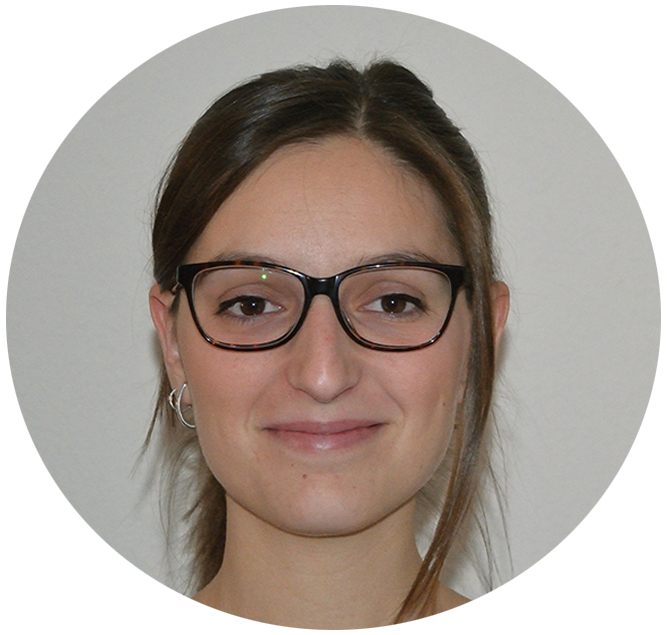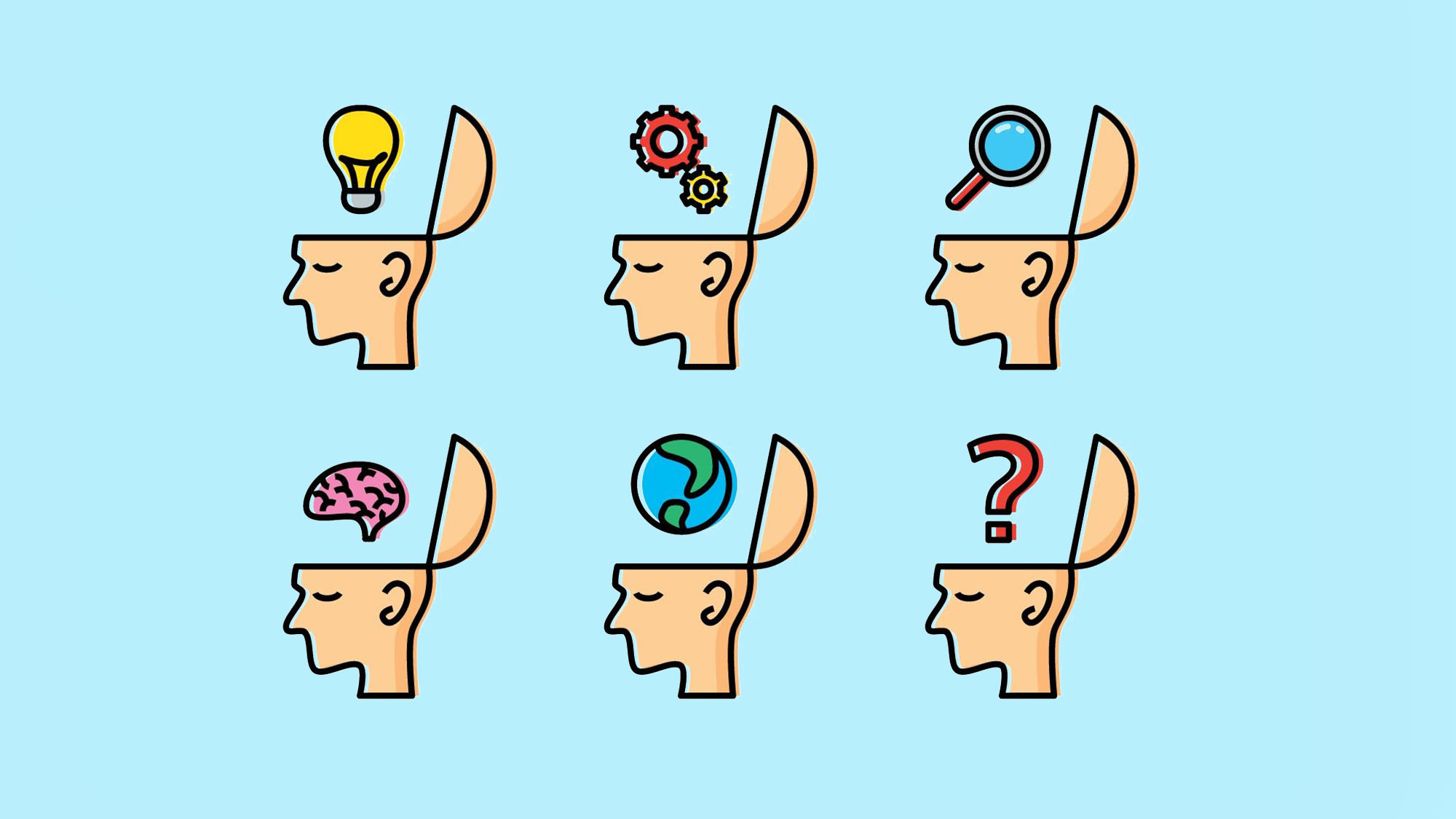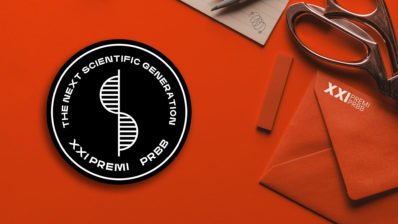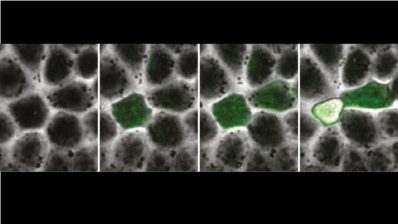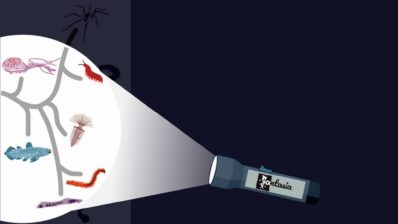The 25th edition of the World Brain Week (BAW) took place from March 15 to 21. This global campaign is aimed at increasing public awareness of the progress and benefits of brain research. Every March, it brings together the efforts of hundreds of participating organizations around the world to host a brain festival aimed at the general public of all ages.
The Department of Experimental and Health Sciences, Pompeu Fabra University (DCEXS-UPF) organized several online activities related to Neurosciences: a Forum about Alzheimer’s, a talk aimed at university extension classrooms for senior citizens, talks for high school students and a campaign on social networks.
Other PRBB centers, such as the Institute for Evolutionary Biology (IBE: CSIC-UPF), also held events during the week.
Bringing Alzheimer’s to the general public
On Monday, March 15, the first Alzheimer’s Forum: “Advances in the diagnosis of the disease” took place, in which 120 people participated. The speakers were Francisco J. Muñoz, from the Molecular Physiology Laboratory of the DCEXS; Eduard Riera, coordinator of Nuclear Medicine at Cetir Ascires; Nina Gramunt, technical director of the Social and Outreach Area of the Pasqual Maragall Foundation and Montse Farré, a relative of an Alzheimer’s patient.
The experts addressed issues such as the molecular bases of the disease, the role of image-based techniques in its diagnosis, the guidelines for its prevention or the steps taken from the diagnosis from a medical and personal level. The activity was organized with the support of the Cátedra QUAES-UPF de Biomedicina e Ingeniería Biomédica.
Alzheimer’s was also the subject of the talk given by Francisco J. Muñoz on Thursday 18 for the Tiana-Mongat University Extension Classroom for senior citizens, organized together with the Cátedra QUAES . In this conference entitled “Molecular and cellular pathophysiology of Alzheimer‘s disease”, Muñoz presented the general characteristics of the disease, its molecular basis and the factors that trigger it. He also addressed issues such as its diagnosis, existing pharmacological approaches or the current research challenges.
Direct to the classroom: cannabis and the brain for teens
The purpose of the talks for high school students was to get them in touch with some of the neurobiology lines of research. On Monday, March 15, PhD students Araceli Bergada and Lucia de los Reyes from the UPF Neuropharmacology-Neurophar Laboratory gave the talk “What effects does cannabis produce on our brain?”. They presented the main effects of cannabis on the brain and the differences between its recreational and its therapeutic use. They also explained how they study the effects of this drug in the laboratory using animal models to understand how it affects memory and learning, fear and anxiety, and motor coordination mechanisms. Three groups of students from the Nou Patufet School, Sagrat Cor Diputació and Santíssima Trinitat attended the online talk.
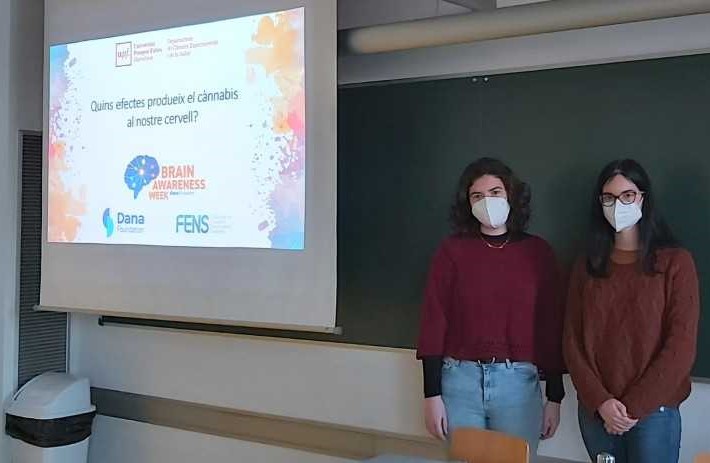
On the other hand, UPF professor Fernando Giráldez presented “The scientific search for the human mind”, organized by the Barcelona Biomedical Research Park (PRBB)) and the DCEXS. In his talk, he explained how genetics and the scientific study of the brain have not only allowed remarkable advances in medicine, but have greatly impacted the way we understand the human condition. He focused on how neurosciences have helped to better understand the nature of perception, memory or emotions, thus providing a new and complex look at fundamental problems in philosophy, education, or art. Around 400 students from nine educational centers from different parts of Catalonia participated. Despite not being able to see their faces, Giráldez managed to capture the students’ attention and interact with them through the Mentimeter tool with which he asked them questions to discover their ideas and knowledge. At the end of the talk, there was also time to answer the multiple questions they wrote in the chat.
The Institute for Evolutionary Biology (IBE: CSIC-UPF) organized a talk for the 4th year ESO students of the Caterina Albert Institute by researcher Ricard Solé. In this lecture, he addressed some questions such as “Is aging a reversible process?”, “How does the brain evolve?” or “Can we create an artificial brain?”.
Denying “Neuromyths” on the internet
In addition, throughout the week the DCEXS launched a Twitter campaign on “Neuromyths”. It consisted on short videos by research staff from the department in which they denied pre-established ideas about the brain, from the point of view of their field of knowledge. Some of the questions they answered were:
- Is it true that we only use 10% of our brain?
- Does learning depend on the formation of new neurons?
- Does the number of neurons in our brain vary throughout our lives?
The participants were Marcel Ruiz-Mejías, expert in Neuroscience and education and researcher of the Educational Research Group in Health Sciences (GRECS); Laia Alegre and Alba García, from the Behavioral Neurobiology Research Group (GReNeC); and Pol Picón, from the Molecular Physiology Laboratory.
The activities were supported by the DANA Foundation and the Federation of European Neuroscience Societies (FENS).
